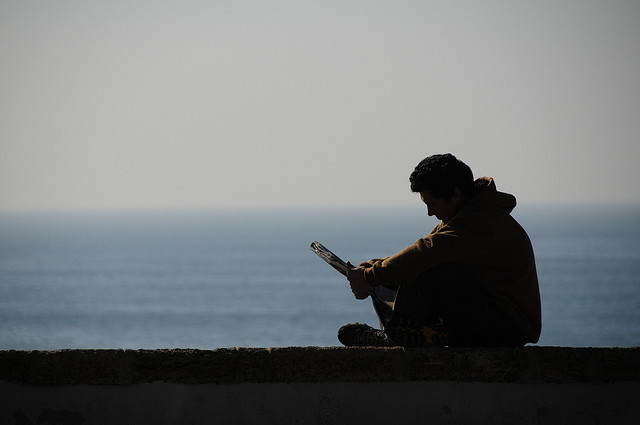We are all guilty of it at one point or another. At least once a day we all find ourselves lying in bed in the dark scrolling through Instagram instead of flipping through pages, hanging on to the every word of Frank Underwood rather than Emily Dickinson or typing up our haphazard thoughts instead of highlighting our favorite passages.
We don’t jump as eager;y to the next novel with the same excitement that we had when we were dying to know the adventure Jack and Annie’s magic treehouse would take them on next. We are just as proud to declare that we watched the whole new season of “Orange is the New Black” in one weekend as we are to recall that time we read “Harry Potter and the Deathly Hallows” in 24 hours.
Somehow, as television became instantaneous and Twitter feeds became available at the literal tips of our fingers, books have become less magical. Now, books are something we look back on with a “remember when” nostalgia. As Lemony Snicket once said, “It is most likely that I will die next to a pile of books I was meaning to read.”
While this is still true for most of us, it no longer seems like something that makes us sad. Sure, we never read the complete works of Jane Austen, but we saw Keira Knightley’s version of “Pride and Prejudice.” No, we didn’t read the newspaper everyday like we said we would, but we didn’t miss an episode of “The Colbert Report” for three seasons in a row. Same thing, right?
This devaluing of literature in today’s society is threatening one of the world’s oldest professions. It is not hard to imagine that, soon, the only successful writers in the United States will be those who draft scripts and scribe speeches. Before long, the only words that will be valued are those that can be spat out by comedians, used in the forward of a popular television show or be condensed to a status update.
It is up to us, those who still read the editorial sections of newspapers and get paper cuts when we fall asleep holding our books too loosely, to preserve the art of reading. We must cling to sentence structure and page count as we donate books to libraries and drive across towns to find the perfect copy of “Willy Wonka and the Chocolate Factory.” We must call every second-hand store in our area to find the first edition of “To Kill a Mockingbird” to give our moms and dig through bargain bins for a corset novel to read on the beach.
Even if we must think of books somewhat nostalgically, we must think of them. We musn’t forget that, as children, we read by the dim glow of a “The Little Prince” nightlight, not by the blue tint of a Facebook profile. We wanted to know what happens when you give a mouse a cookie, not what would happen if we ignore mom and sit really close to the TV. Reading gave us the tools we needed to go into the world as creative, intelligent adults and it is now up to us to make sure a paperback has the same effect on today’s youngsters.
Next time you are babysitting or visiting your gaggle of nieces and nephews over the holidays, turn off “Dora the Explorer” and pull out your well-worn copy of “Where the Wild Things Are.” Recall with love how Max was sent to his room without any supper and remind the next generation of the power of imagination. Listen as breaths catch in their throats when the young hero declares “Let the wild rumpus start!” See the anxiety in their eyes when Max’s boat is tossed around by the storm.
Make the magic of reading something they won’t forget and let it remind you of your own fear the first time you saw Bilbo face a trio of hungry trolls and the loss you felt when you reached the end and were no longer in the company of Thorin Oakenshield.
Next time you lie in bed, leave the light on and make new friends as you crack the spine of whatever you’ve been meaning to read next. Remember what reading used to be, before you were too busy or realized semi-coherent thoughts could be formed in 140 characters. Cling to the past despite an uncertain future because, after all, where would we be without the valuable lessons of the Berenstain Bears?
Photo courtesy Kamil Porembinski, Creative Commons.









